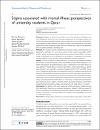Stigma associated with mental illness: perspectives of university students in Qatar
| المؤلف | Zolezzi, Monica |
| المؤلف | Bensmail, Nawal |
| المؤلف | Zahrah, Farah |
| المؤلف | Khaled, Salma Mawfek |
| المؤلف | El-Gaili, Tayseer |
| تاريخ الإتاحة | 2017-06-04T10:12:21Z |
| تاريخ النشر | 2017-05-09 |
| اسم المنشور | Neuropsychiatric Disease and Treatment |
| المعرّف | http://dx.doi.org/10.2147/NDT.S132075 |
| الاقتباس | Monica Zolezzi, Nawal Bensmail, Farah Zahrah, Salma Mawfek Khaled, Taysier El-Gaili, Salma Khaled "Stigma associated with mental illness: perspectives of university students in Qatar" Neuropsychiatric Disease and Treatment, May 2017, volume 13 |
| الرقم المعياري الدولي للكتاب | 1176-6328 |
| الملخص | Stigma in relation to mental illness is one of the main factors inhibiting people from seeking help. Studies have been undertaken looking into the knowledge, attitudes, and beliefs (KAB) about mental illness among residents in Qatar; however, none have looked specifically at students in higher education. The aim of this study was to understand the KAB toward mental illness among students at a Qatari university and determine if there are any differences based on gender, nationality, and college type. A convenience sample of students from all genders, colleges, and nationalities was approached to participate in a survey that consisted of four sections: demographic, beliefs, attitudes, and help-seeking and treatment preferences associated with mental illness. Chi-square testing was performed to test for differences in the distribution of proportions of our primary outcomes (students' beliefs, attitudes, and help-seeking and treatment preferences). A total of 282 students completed the survey. The majority of the participating students were females (59.3%), non-Qataris (64.3%), and enrolled in science-based colleges (62.7%). Beliefs reflecting poor mental health literacy, such as "medications to treat mental illness can cause addiction", "mental illness is not like any other illness", or that "mental illness is a punishment from God", were reported by a majority of students (84.4%, 56.7%, and 50.2%, respectively). Stigmatizing attitudes that were endorsed by a majority of students included believing that people with mental illness cannot have regular jobs (60.2%), that people with mental illness are dangerous (65.7%), and that they would not marry someone with a mental illness (88.9%). Additionally, 33.6% of students indicated they would be ashamed to mention if someone in their family or they themself, had a mental illness. A vast majority of students (86.3%) indicated to prefer family and friend's support as treatment options. Significant differences in KAB about mental illness between genders, colleges, and college type were found only for a few items. The findings of this study suggest that a high percentage of students reported KAB about mental illness, that are considered stigmatizing. Students' KAB about mental illness was consistent with that reported by the general population in Qatar. Nevertheless, the sample was small and as such, larger studies from a randomly selected population are needed to confirm these findings. |
| اللغة | en |
| الناشر | Dove Press |
| الموضوع | attitude and behavior knowledge mental illness stigmatization university students |
| النوع | Article |
| الصفحات | 1221-1233 |
| رقم المجلد | 13 |
| ESSN | 1178-2021 |
الملفات في هذه التسجيلة
هذه التسجيلة تظهر في المجموعات التالية
-
أبحاث الصيدلة [1454 items ]
-
الأبحاث [297 items ]


